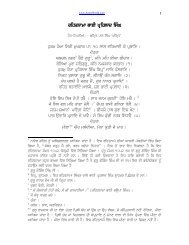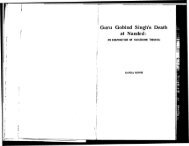- Page 2 and 3: The Sikh diaspora
- Page 4 and 5: The Sikh diaspora The search for st
- Page 6 and 7: Contents Foreword by the Series Edi
- Page 8 and 9: Conclusion 177 Appendices 180 Notes
- Page 10 and 11: Golden Temple in Amritsar to dislod
- Page 12 and 13: Punjab Research Group would recogni
- Page 14 and 15: Map 1 xiii
- Page 16 and 17: Map 2 xv
- Page 18 and 19: Introduction On 3 June 1984, in a m
- Page 20 and 21: distinguish the experiences of diff
- Page 22 and 23: • A troubled relationship with ho
- Page 24 and 25: esult of conflict between dominant
- Page 26 and 27: xxv Punjabi words are defined on th
- Page 30 and 31: 4 THE SIKHS: SEARCH FOR STATEHOOD o
- Page 32 and 33: 6 THE SIKHS: SEARCH FOR STATEHOOD t
- Page 34 and 35: 8 THE SIKHS: SEARCH FOR STATEHOOD m
- Page 36 and 37: 10 THE SIKHS: SEARCH FOR STATEHOOD
- Page 38 and 39: 12 THE SIKHS: SEARCH FOR STATEHOOD
- Page 40 and 41: 14 THE SIKHS: SEARCH FOR STATEHOOD
- Page 42 and 43: 16 THE SIKHS: SEARCH FOR STATEHOOD
- Page 44 and 45: 18 THE SIKHS: SEARCH FOR STATEHOOD
- Page 46 and 47: 20 THE SIKHS: SEARCH FOR STATEHOOD
- Page 48 and 49: 22 THE SIKHS: SEARCH FOR STATEHOOD
- Page 50 and 51: 24 THE SIKHS: SEARCH FOR STATEHOOD
- Page 52 and 53: 26 THE SIKHS: SEARCH FOR STATEHOOD
- Page 54 and 55: 28 THE SIKH DIASPORA: A HISTORY OF
- Page 56 and 57: 30 THE SIKH DIASPORA: A HISTORY OF
- Page 58 and 59: 32 THE SIKH DIASPORA: A HISTORY OF
- Page 60 and 61: 34 THE SIKH DIASPORA: A HISTORY OF
- Page 62 and 63: 36 THE SIKH DIASPORA: A HISTORY OF
- Page 64 and 65: 38 THE SIKH DIASPORA: A HISTORY OF
- Page 66 and 67: 40 THE SIKH DIASPORA: A HISTORY OF
- Page 68 and 69: 42 THE SIKH DIASPORA: A HISTORY OF
- Page 70 and 71: 44 THE SIKH DIASPORA: A HISTORY OF
- Page 72 and 73: 46 THE SIKH DIASPORA: A HISTORY OF
- Page 74 and 75: 48 DIALECTICS OF ETHNIC LINKAGES re
- Page 76 and 77: 50 DIALECTICS OF ETHNIC LINKAGES So
- Page 78 and 79:
52 DIALECTICS OF ETHNIC LINKAGES of
- Page 80 and 81:
54 DIALECTICS OF ETHNIC LINKAGES di
- Page 82 and 83:
56 DIALECTICS OF ETHNIC LINKAGES ap
- Page 84 and 85:
58 DIALECTICS OF ETHNIC LINKAGES Al
- Page 86 and 87:
60 DIALECTICS OF ETHNIC LINKAGES re
- Page 88 and 89:
62 DIALECTICS OF ETHNIC LINKAGES gu
- Page 90 and 91:
64 DIALECTICS OF ETHNIC LINKAGES Ra
- Page 92 and 93:
66 DIALECTICS OF ETHNIC LINKAGES Un
- Page 94 and 95:
68 THE SIKH DIASPORA AND THE PUNJAB
- Page 96 and 97:
70 THE SIKH DIASPORA AND THE PUNJAB
- Page 98 and 99:
72 THE SIKH DIASPORA AND THE PUNJAB
- Page 100 and 101:
74 THE SIKH DIASPORA AND THE PUNJAB
- Page 102 and 103:
76 THE SIKH DIASPORA AND THE PUNJAB
- Page 104 and 105:
78 THE SIKH DIASPORA AND THE PUNJAB
- Page 106 and 107:
80 THE SIKH DIASPORA AND THE PUNJAB
- Page 108 and 109:
82 THE SIKH DIASPORA AND THE PUNJAB
- Page 110 and 111:
84 THE SIKH DIASPORA AND THE PUNJAB
- Page 112 and 113:
86 THE SIKH DIASPORA AND THE PUNJAB
- Page 114 and 115:
88 THE SIKH DIASPORA AND THE PUNJAB
- Page 116 and 117:
90 THE SIKH DIASPORA AND THE PUNJAB
- Page 118 and 119:
FIVE Demand for homeland: Sikhs in
- Page 120 and 121:
94 DEMAND FOR HOMELAND: SIKHS IN NO
- Page 122 and 123:
96 DEMAND FOR HOMELAND: SIKHS IN NO
- Page 124 and 125:
98 DEMAND FOR HOMELAND: SIKHS IN NO
- Page 126 and 127:
100 DEMAND FOR HOMELAND: SIKHS IN N
- Page 128 and 129:
102 DEMAND FOR HOMELAND: SIKHS IN N
- Page 130 and 131:
104 DEMAND FOR HOMELAND: SIKHS IN N
- Page 132 and 133:
106 DEMAND FOR HOMELAND: SIKHS IN N
- Page 134 and 135:
108 DEMAND FOR HOMELAND: SIKHS IN N
- Page 136 and 137:
110 DEMAND FOR HOMELAND: SIKHS IN N
- Page 138 and 139:
112 DEMAND FOR HOMELAND: SIKHS IN N
- Page 140 and 141:
114 DEMAND FOR HOMELAND: SIKHS IN B
- Page 142 and 143:
116 DEMAND FOR HOMELAND: SIKHS IN B
- Page 144 and 145:
118 DEMAND FOR HOMELAND: SIKHS IN B
- Page 146 and 147:
120 DEMAND FOR HOMELAND: SIKHS IN B
- Page 148 and 149:
122 DEMAND FOR HOMELAND: SIKHS IN B
- Page 150 and 151:
124 DEMAND FOR HOMELAND: SIKHS IN B
- Page 152 and 153:
126 DEMAND FOR HOMELAND: SIKHS IN B
- Page 154 and 155:
128 DEMAND FOR HOMELAND: SIKHS IN B
- Page 156 and 157:
SEVEN Mediating between states: Sik
- Page 158 and 159:
132 SIKH DIPLOMACY AND INTERSTATE R
- Page 160 and 161:
134 SIKH DIPLOMACY AND INTERSTATE R
- Page 162 and 163:
136 SIKH DIPLOMACY AND INTERSTATE R
- Page 164 and 165:
138 SIKH DIPLOMACY AND INTERSTATE R
- Page 166 and 167:
140 SIKH DIPLOMACY AND INTERSTATE R
- Page 168 and 169:
142 SIKH DIPLOMACY AND INTERSTATE R
- Page 170 and 171:
144 SIKH DIPLOMACY AND INTERSTATE R
- Page 172 and 173:
146 SIKH DIPLOMACY AND INTERSTATE R
- Page 174 and 175:
148 SIKH DIPLOMACY AND INTERSTATE R
- Page 176 and 177:
150 SIKH DIPLOMACY AND INTERSTATE R
- Page 178 and 179:
152 SIKH DIPLOMACY AND INTERSTATE R
- Page 180 and 181:
EIGHT Call of homeland: models and
- Page 182 and 183:
156 MODELS AND REALITY OF ETHNIC MO
- Page 184 and 185:
158 MODELS AND REALITY OF ETHNIC MO
- Page 186 and 187:
160 MODELS AND REALITY OF ETHNIC MO
- Page 188 and 189:
162 MODELS AND REALITY OF ETHNIC MO
- Page 190 and 191:
164 MODELS AND REALITY OF ETHNIC MO
- Page 192 and 193:
166 MODELS AND REALITY OF ETHNIC MO
- Page 194 and 195:
168 MODELS AND REALITY OF ETHNIC MO
- Page 196 and 197:
170 MODELS AND REALITY OF ETHNIC MO
- Page 198 and 199:
172 MODELS AND REALITY OF ETHNIC MO
- Page 200 and 201:
174 MODELS AND REALITY OF ETHNIC MO
- Page 202 and 203:
176 MODELS AND REALITY OF ETHNIC MO
- Page 204 and 205:
178 CONCLUSION realignment of Sikh
- Page 206 and 207:
Appendices
- Page 208 and 209:
182 APPENDICES Sant Harchand Singh
- Page 210 and 211:
184 APPENDICES Article 1: duty to e
- Page 212 and 213:
APPENDIX 4 Excerpts from a letter t
- Page 214 and 215:
APPENDIX 5 Appeal from Sant Harchan
- Page 216 and 217:
APPENDIX 6 Excerpts from the Anandp
- Page 218 and 219:
Notes Introduction 1. Government of
- Page 220 and 221:
194 NOTES represent any community.
- Page 222 and 223:
196 NOTES 24. Sethi (1992) and Pett
- Page 224 and 225:
198 NOTES accused Bombay Sikhs of p
- Page 226 and 227:
200 NOTES 7. In a letter to the dep
- Page 228 and 229:
202 NOTES another Dutch trawler was
- Page 230 and 231:
204 NOTES 14. Des Pardes, 26 Januar
- Page 232 and 233:
206 NOTES 40. For the Surrey gurdwa
- Page 234 and 235:
208 NOTES many couched in abusive l
- Page 236 and 237:
210 NOTES with an office at 16-18 F
- Page 238 and 239:
212 NOTES wrote, “In your article
- Page 240 and 241:
214 NOTES commissioner in June 1984
- Page 242 and 243:
216 NOTES 26. A resolution was pass
- Page 244 and 245:
218 NOTES 51. World Sikh News, 22 M
- Page 246 and 247:
220 NOTES stooges of the Indian gov
- Page 248 and 249:
222 NOTES 10. Des Pardes, 29 June 1
- Page 250 and 251:
224 NOTES 33. Des Pardes, 23 Septem
- Page 252 and 253:
226 NOTES 55. Michael Foot, along w
- Page 254 and 255:
228 NOTES 80. Independent, 13 Novem
- Page 256 and 257:
230 NOTES 11. Hindustan Times, 3 Au
- Page 258 and 259:
232 NOTES less maturity”. In a le
- Page 260 and 261:
234 NOTES 60. Letter to Gary Condit
- Page 262 and 263:
236 NOTES would be misunderstood by
- Page 264 and 265:
238 NOTES 107. Gunnar Skaug’s let
- Page 266 and 267:
240 NOTES 17. Recent fiction has ad
- Page 268 and 269:
242 NOTES 31. Indo-Canadian Times,
- Page 270 and 271:
244 NOTES 50. Indo-Canadian Times,
- Page 272 and 273:
246 GLOSSARY AND ABBREVIATIONS dhar
- Page 274 and 275:
248 GLOSSARY AND ABBREVIATIONS cong
- Page 276 and 277:
250 BIBLIOGRAPHY Inquiry into the c
- Page 278 and 279:
252 BIBLIOGRAPHY India Committee. T
- Page 280 and 281:
254 BIBLIOGRAPHY Bawa, Baldev 1994.
- Page 282 and 283:
256 BIBLIOGRAPHY Parmjit Singh Panj
- Page 284 and 285:
258 BIBLIOGRAPHY Great Britain Awaz
- Page 286 and 287:
260 BIBLIOGRAPHY Brass, P. 1974. La
- Page 288 and 289:
262 BIBLIOGRAPHY Fair, C.C. 1996. F
- Page 290 and 291:
264 BIBLIOGRAPHY Josephides, S. 199
- Page 292 and 293:
266 BIBLIOGRAPHY McLeod, W.H. (ed.)
- Page 294 and 295:
268 BIBLIOGRAPHY Popplewell, R. 198
- Page 296 and 297:
270 BIBLIOGRAPHY Singh, P. & N.G.Ba
- Page 298 and 299:
272 BIBLIOGRAPHY Virk, K.S. & H.Sin
- Page 300 and 301:
274 INDEX Amarjit Singh 125, 185 Am
- Page 302 and 303:
276 INDEX Indo-Canadian extradition
- Page 304 and 305:
278 INDEX Dilgeer, H.S. 151, 242 n.
- Page 306 and 307:
280 INDEX Hawaii 51 Hawley, J.S. 83
- Page 308 and 309:
282 INDEX Jagjit Singh 79 Jahangir,
- Page 310 and 311:
284 INDEX Mann, Simranjit Singh 127
- Page 312 and 313:
286 INDEX campaign for Punjabi spea
- Page 314 and 315:
288 INDEX Rudolph, S.H. 38 Russia 9
- Page 316 and 317:
290 INDEX Sikhs studies 70, 74, 81-
- Page 318 and 319:
292 INDEX contribution to the Golde


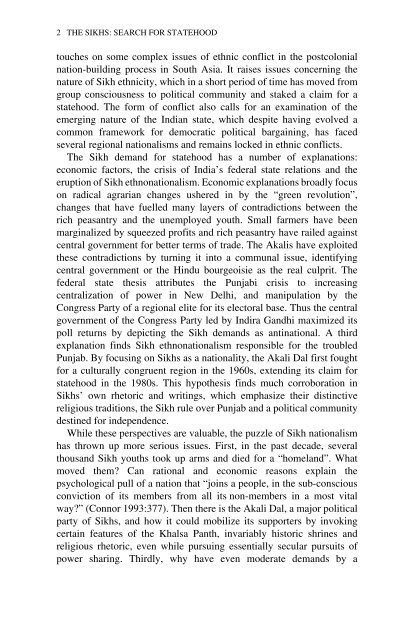
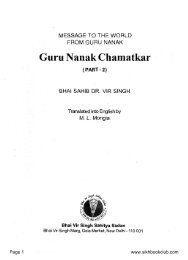
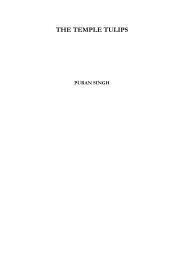
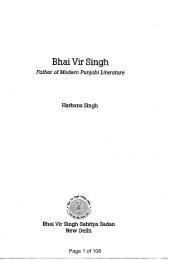

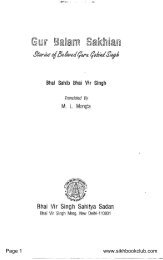
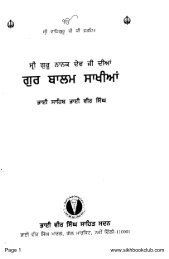
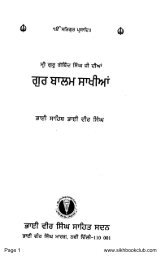
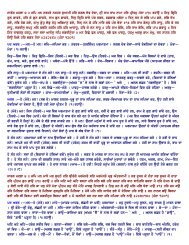
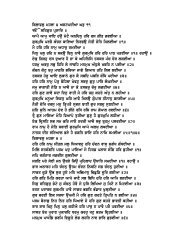
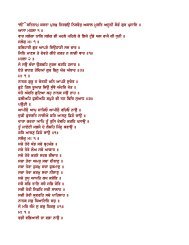
![cOpeI ] hmrI kro hwQ dY r~Cw ] pUrn hoie ic~q kI ie ... - Vidhia.com](https://img.yumpu.com/12240258/1/190x245/copei-hmri-kro-hwq-dy-rcw-purn-hoie-icq-ki-ie-vidhiacom.jpg?quality=85)
